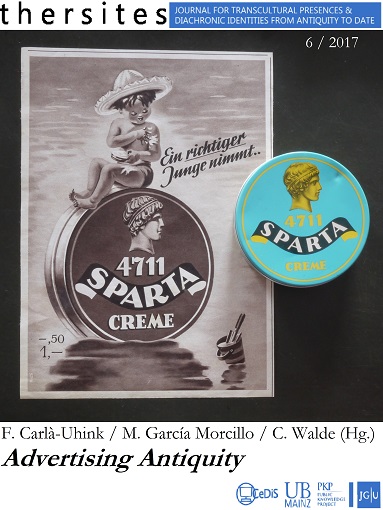Homeric Hipsters
DOI:
https://doi.org/10.34679/thersites.vol6.71Keywords:
Advertising, Antiquity, Homer, Cosmetics, Beard, Iconography, Reception StudiesAbstract
This paper investigates the use of Ancient Greek imagery in the marketing of male grooming products. Based on a case study of the cosmetics brand HOMMER, the paper analyses how elements such as scent and product ingredients combined with a visual profile and storytelling, provide consumers with elements for an experientially based identity creation. Based on psychological and archaeological theory, the athour argues that the intersection between product, advertising and consumer constitutes a play with identity and the potential for multisensory "time travel." By identifying the elements of a product poster, the visual narrative of a single product, a beard wipe, is shown to contain all the elements of the dominant Modern Greek national narrative and more, tying Greek notions of ancient and modern history to anglo-saxon sailor symbolism and the Neo-hipster phenomenon.Downloads
Additional Files
Published
2018-05-28
Issue
Section
Essays
License
Copyright (c) 2018 Tao T. Makeeff

This work is licensed under a Creative Commons Attribution-NonCommercial 4.0 International License.
Authors who publish with thersites agree to the following terms:
- Publishing in thersites is free of any charges.
- Authors retain copyright and grant the journal right of first publication.
- Users are allowed to read, download, copy, distribute, print, search, or link to the full texts of the articles, or use them for any other lawful purpose, without asking prior permission from the publisher or the author, so long as the original work is properly cited and is not used for commercial purposes. The journal is published under the Creative Commons Attribution 4.0 International License. More information about this license is available at https://creativecommons.org/licenses/by/4.0/.
- Authors are able to enter into separate, additional contractual arrangements for the non-exclusive distribution of the journal's published version of the work (e.g., post it to an institutional repository or publish it in a book), with an acknowledgement of its initial publication in this journal.
- Authors are permitted and encouraged to post their work online (e.g., in institutional repositories or on their website) as it can lead to productive exchanges, as well as earlier and greater citation of published work (See The Effect of Open Access).


